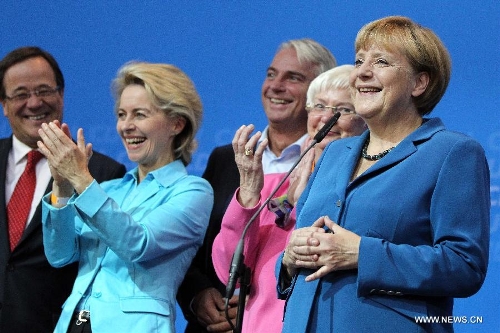Merkel wins big in Germany election

German Chancellor Angela Merkel (1st R) is applauded after first exit polls in the German general election at the CDU party headquarters in Berlin on Sept. 22, 2013. The latest exit poll results showed Sunday that Merkel's conservative Christian Democrats (CDU) and their Bavarian sister party the Christian Social Union (CSU) could have an absolute majority if the FDP and the AfD fail to enter the new parliament. (Xinhua/Luo Huanhuan)
Support for Merkel's conservative bloc - her Christian Democratic Union and the Bavarian Christian Social Union - stood at some 42 percent in Germany's national election held on Sunday, according to the latest exit polls released late Sunday by Germany-based ARD television.
The figure, which is enough to put her on track for a third term and the biggest election win since 1990, is about 16 points ahead of the Social Democrats (SPD), the second-biggest party.
But it was unclear whether she would be able to preserve her center-right coalition or be forced to work with her leftist rivals, exit polls showed.
The exit polls from the first national election since the eruption of the eurozone debt crisis in 2009 did not give a clear indication of whether her business-friendly Free Democrats (FDP) allies, on 4.7 percent, would make it back into parliament.
She wants to continue the center-right coalition with the FDP she has led for the past four years.
However, if the FDP fails to get into the Bundestag, lower house of German parliament, then Merkel will almost certainly have to court and enter coalition talks with the SPD, with whom she governed in a right-left coalition from 2005 to 2009.
The SPD would exact a high price in such talks, including top cabinet posts such as the finance ministry and acceptance of key parts of its platform, such as a minimum wage and tax hikes for the wealthy.
"They will be the most difficult coalition talks ever," said Frank Decker, a political scientist at Bonn University.
Analysts said the talks could last months.
Some hope Merkel will take a softer stance on struggling eurozone states such as Greece if she enters a so-called grand coalition with the SPD, following more support for a new anti-euro party.
But major policy shifts seem unlikely because the center-left SPD agrees with the thrust of Merkel's approach even as it accuses her of weak leadership.
Ding Chun, director of the Center for European Studies at Fudan University, told the Global Times that German policy toward the eurozone would not see great changes.
"Merkel's reaction to the crisis safeguarded Germany's interests and prevented the bloc's collapse, which has satisfied every party, giving her more chance to win this election," said Ding.
"SPD and the Merkel-led center-right coalition actually don't have key disagreement on the policy toward eurozone," noted Ding.
Merkel still faces major challenges in a new term, from bedding down her shift from nuclear to renewable power to fending off a demographic crisis, and setting out a vision for Europe.
Reuters contributed to this story